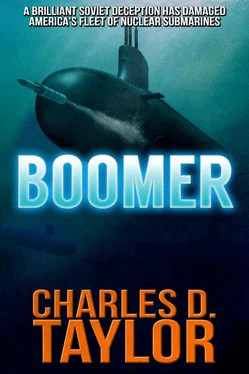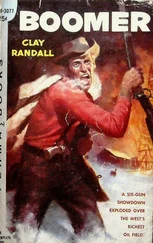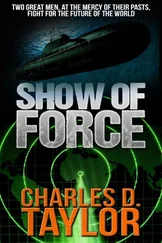The loneliest man in Russia rose from his desk and strolled slowly to the window. One-way glass prevented anyone from looking up at him, but it also produced an odd glare that altered his perception of the people on the walkways below. He couldn’t see whether any of them were familiar to him — but he was sure none of them wanted to die that day or the next, nor would they appreciate the sacrifice of their famines in a nuclear exchange with the U.S. The people no longer harbored the hatred for Americans that he and his friends remembered and that the old men retained with a vengeance. Most of them — those under forty, anyway — actually believed that the two nations could live with each other; separately, because they were so different, but many no longer saw the necessity for the ascendancy of only one system of government.
Less than an hour before, the KGB head had explained that the President of the United States remained behind closed doors with his closest advisors. There had been no response, no statement. Even his most highly placed intelligence operatives in Washington reported they had no access to any rumor of what might be taking place. Therefore, the assumption among his own advisors was that the White House was plotting revenge on the Soviet Union. Wouldn’t that be Washington’s natural reaction?
Now, before the discussion had even opened, it seemed a majority of the Defense Council was for carrying out the original intent of those past leaders — continue to destroy the SS8N element of the American triad. The USSR could neutralize the balance of U.S- striking power. A successful first strike by the USSR would eventually be a definite possibility. That’s exactly what one of them said, and others had enthusiastically agreed with him.
The General Secretary had questioned how the loss of just two SSBN’s could justify that position. After all, there were a number of others, not to mention missiles and bombers. The answer had been that another American SSBN was about to be destroyed in the Pacific. One more after that would definitely alter the strategy in that part of the world. In the Atlantic, sufficient plans had been activated to neutralize enough of the Lafayette and Ben Franklin class of SSBN’s to keep U.S. retaliation within acceptable bounds. Acceptable bounds! That’s what he was facing now.
His expressions of repugnance at the entire plan had fallen on too many deaf ears. More members of the small group than he anticipated — too many — now wondered if a first strike might not be their only solution now that they had gotten this far. He found more disagreement with his position than he would ever have imagined, enough so that he had been given time to reconsider that position. That meant that a silent revolt against his leadership was a distinct possibility. And he had few close associates he could depend on.
That’s what happened when a man distanced himself from the loyal party members. It was almost like being a prisoner in his own — no, not almost — he was technically a prisoner within the Kremlin if he did not accede.
Who should he turn to? Was there a single individual whose support would force the others to rethink their positions? He doubted that.
In the end the loneliest man in the Soviet Union called his wife and asked her to join him for dinner at his suite within the Kremlin. She was neither a lover of Americans nor a supporter of the party leadership, but perhaps she might offer a solution. At the least, she wouldn’t complain about the amount of vodka he anticipated drinking.
She’d understand.
If he could convey the gravity of his personal situation, she would understand and perhaps, just perhaps, bridge the widening chasm.…
* * *
“Hell nooo …” Jimmy Cross answered. His standard response, the affectation he assumed everyone enjoyed, was for Buck Nelson. They were the only ones in the wardroom. The question Florida’ s captain had just asked concerned whether or not the sonar contact had been identified. “If I had to guess, I’d say it was a Russian submarine out to find out a little more about an American boomer.”
“That’s pretty definitive, I’d say.” Nelson was carefully polishing his rimless glasses with a wrinkled handkerchief, “What makes you so sure?”
“Well, all things considered, I can’t come up with anything else. Although we’ve been maneuvering to get a track on it, it still seems to be on the same general bearing, so that means it’s probably coming toward us if its sound remains as solid. It also means it probably could pick us up by pure dumb-ass luck. There’s no possible way it could know about our sector.” The executive officer was explaining his reasoning in his normal, slow drawl. Nothing was ever hurried with Jimmy Cross, and Nelson had yet to see anything that would ever excite his XO. Corn-patch hair fell over his forehead like a Grand Ole Opry star’s, and he looked as if he’d be just as comfortable in overalls and bare feet. Yet the man was more effective in an emergency than anyone Nelson had ever worked with. He fooled most people.
“Why couldn’t it be one of our own?”
“It could be, Captain. But they shouldn’t be in our sector without some warning to make sure we didn’t blow their ass out of the water. Perhaps if sonar conditions were better, we’d have an ID by now. When in doubt.…” He shrugged without finishing the sentence when the phone buzzed.
“Captain here.” Nelson listened patiently. “Thank you. I’ll stop up if you need me. Otherwise.…” He hung up the phone, then replaced his glasses very carefully, balancing them precisely on his nose with the thumbs and index fingers of both hands. “There. Perhaps you have a point, Jimmy. That was Dan Mundy and he says there’s a definite change in the sound clarity of that contact. Maybe he slowed down.”
“Which means that he figured if he hears us, then we may be able to hear him. And if he’s as smart as we are, he’s going to reduce his noise signature as much as possible to see how close he can get.” Cross rubbed his chin with the back of his hand to see if he needed a shave. He always claimed it was tough to see the blond stubble, which was preferable to admitting he could forget simple, personal hygiene during those periods when he never slept. His inability to note the passing of days was a direct result of catnapping at sea instead of sleeping for any regular period of time. “You know those Russians like to sneak in from behind and just listen.”
“Dan said the chief just couldn’t classify a type or anything like that, so we have to assume he’s probably still at a distance.” Buck Nelson was peering over his glasses now in a manner that said he was looking for a suggestion.
“Don’t let him sniff our butt, Captain. That’s what I say.”
“Me, too.” Nelson picked up the phone and pressed the button for the control room. “Jeffrey, we’re going to let you take the ride of your life — so strap yourself down. Wind her all the way up to fifteen knots and change course to the southeast corner of the sector. And continue the roller-coaster ride, too.” He listened to the response from his OOD, winked at Cross and said, “That’s right, you could be the next galloping ghost.”
“He needs an attack boat his next tour,” the XO said, “something he can use to go charging after the bad guys.”
“Sometimes I think he should have gone to Pensacola and got himself some wings. He’s good enough to do anything he wants. So tell me, Jimmy,” he continued in the next breath, “what would you do if you were a Russian sub who just happened on to an unfriendly boomer and then found you were losing contact?”
“Speed up.”
Читать дальше












